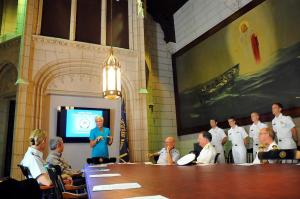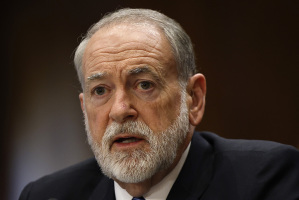School Choir's Right to Sing Christmas Carols Restored in Wisconsin
Alliance Defending Freedom (ADF) declared victory in a Christmas music case following a public outcry against a Wisconsin school board's alleged attempt to limit religious songs in school performances. The Master Singers, Wausau West High School's elite choir, which formed the center of the debate, resumed practice on Tuesday.
"The courts have never thought [of religious songs in schools as] a problem because there's obvious secular reasons for them in concerts," Rory Gray, ADF litigation counsel, told The Christian Post on Tuesday. Gray argued for the cultural and educational value of traditional religious songs, mentioning that many traditional carols involve "complex music, written by masters."
The controversy arose early this month when Phillip Buch, director of Wausau West High School's choral programs since 1981, told the Wausau Daily Herald that Wausau School Distrcit administrators gave him three restricting options for Christmas music: include five secular, nonreligious songs for every faith-based carol; hold a concert without any Christmas music; or postpone concerts in December.
Since his elite choir, the 20-member Master Singers, is invited to sing at "nearly a dozen holiday concerts each year," Buch called these demands unacceptable. Due to the new restrictions, he disbanded the group on Oct. 4. "We sing for nursing homes, grade schools and businesses. To do that without Christmas music doesn't make sense," the director said.
In an Oct. 7 statement, Kathleen Williams, Wausau superintendent of schools, argued that "district legal counsel" suggested alternatives to ensure that Master Singers concerts adhered to the law.
"Under the first option, the Master Singers' winter performances would include seasonal and Christmas selections that do not involve the celebration of the religious holiday of Christmas," Williams wrote. "The second option involves changing the format of the Master Singers' winter performances to a theme other than Christmas, so the District could not be challenged as unconstitutionally promoting the religious celebration of Christmas through state-sponsored Christmas caroling."
"Contrary to earlier reports which caused significant misunderstanding, I want to emphasize that committee members affirmed today that no set ratio of religious songs verses non-religious songs was ever established as part of a committee review," Williams added, in a statement dated Oct. 8.
In response, Patrick C. Elliott, staff attorney at the Freedom From Religion Foundation (FFRF) thanked the district for "taking measures to ensure an appropriate music curriculum that does not make religion its primary focus" in a letter dated Oct. 10. "We urge the Board to remain steadfast in providing a secular, inclusive, educational and constitutional music program."
While FFRF supported the new policy, ADF condemned it, assuring the school board that the Constitution does not prohibit the singing of Christmas carols by public school groups. "We write to explain that every federal court to examine the issue has determined that including Christmas carols and other religious music in school choir programs fully complies with the First Amendment," the letter read.
After the suspension of the Master Singers, "the school board is facing a public outcry of massive proportions," ADF's Rory Gray told CP. He added that the rule seemed confusing because the school district said they had received no complaints. "I can't think of another case where a school district decided on its own that there's a problem with holiday concerts," Gray said.
At a well-attended meeting of the school board, the body voted unanimously to begin a performance review of Superintendent Williams, the Wausau Daily Herald reported. Pat McKee, a member of the board, suggested that it waive a clause in Williams' contract that would require her to pay $6,000 if she were to resign without giving the board 90 days notice.
"It looks like cooler heads prevailed and the school district did the right thing," Gray explained. "We're just happy that everything ended well for the people in Wausau."





























